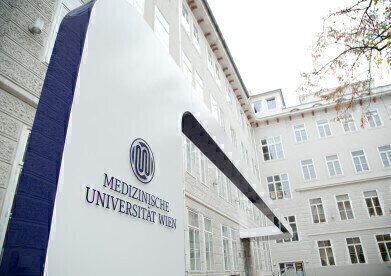-
 MedUni Vienna (Credit: MedUni Vienna)
MedUni Vienna (Credit: MedUni Vienna)
News & Views
Novel Markers of Aggressive Prostate Cancer Discovery
Feb 23 2022
A joint study by teams from MedUni Vienna and University Hospital Vienna, has identified novel cancer markers in patients with aggressive prostate cancer that indicate poorer survival and can therefore be used in future to help assess risk. The research, led by Robert Wiebringhaus and supervised by Lukas Kenner(1) from MedUni Vienna's Department of Pathology and the Department of Laboratory Animal Pathology at Vetmeduni, built on previous research led by Kenner in 2015 which, using a mouse model, recognised that the protein STAT3 has a surprising tumour-suppressing role in prostate cancer.
It was shown at that time that patients with low levels of STAT3 in cancer cells experience significantly worse disease progression than patients with high levels. A follow-up investigation showed that there was a higher metabolic rate in prostate cancer tissue as against healthy prostate tissue. This provides the tumour with extra energy to grow and metastasise.
In the latest investigation (2) by PhD student Robert Wiebringhaus and molecular biologist Brigitte Hantusch prostate cancer tissue was separated from healthy tissue using a laser microscope and the proteome, the totality of the proteins present, was then analysed using mass spectrometry (proteomics analysis). This facilitated the analysis of thousands of different peptides and proteins. There was found to be a higher concentration of proteins of the intracellular mitochondrial respiratory chain in the more aggressive cancer tissue. Mitochondria, which being organelles have structurally delimited cell areas with a specific biological function, are also referred to as the "powerhouses of the cells". In a machinery consisting of enzyme complexes, the so-called respiratory chain or "oxidative phosphorylation" produces energy-rich degradation products via the breakdown of sugar and, in a final step, these generate the universal energy carrier adenosine triphosphate (ATP). This is an important regulator of cellular energy-producing processes. Those cells with a particularly high energy requirement, such as cancer cells, can cover this demand via oxidative phosphorylation.
Two proteins of interest, -NDUFS1 and ATP50- emerged from patient samples following proteomics analysis; using immunohistochemical staining and data analysis, these two proteins were shown to be associated with a lower probability of survival in more aggressive forms of prostate cancer.
Further analyses of the transcriptome, which comprises all genes that are transcribed in the cell at a certain point in time, also showed a rectified shift in the concentration of mRNA (messenger ribonucleic acid). This means that there is a direct correlation between the genetic transcripts and the proteins produced. The current study by Wiebringhaus et al. represents an important step in establishing a link between NDUFS, ATP5O and cancer aggressiveness. The two proteins could therefore serve as additional immunohistochemical markers for aggressive prostate tumours and, at the same time, as new targets for cancer treatment.
(1) Lukas Kenner is a member of the Executive Board of the Comprehensive Cancer Center of MedUni Vienna and University Hospital Vienna
(2) The Study was published in ‘Cancers’
More information online
Digital Edition
ILM 49.5 July
July 2024
Chromatography Articles - Understanding PFAS: Analysis and Implications Mass Spectrometry & Spectroscopy Articles - MS detection of Alzheimer’s blood-based biomarkers LIMS - Essent...
View all digital editions
Events
Jul 28 2024 San Diego, CA USA
Jul 30 2024 Jakarta, Indonesia
Jul 31 2024 Chengdu, China
ACS National Meeting - Fall 2024
Aug 18 2024 Denver, CO, USA
Aug 25 2024 Copenhagen, Denmark

.jpg)

24_06.jpg)













